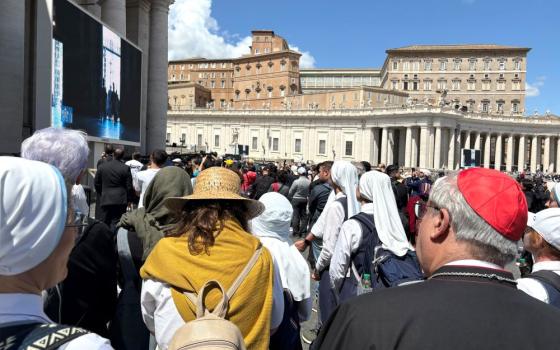There are many reasons to question the United States Conference of Catholic Bishops’ “Fortnight for Freedom,” not least its failure to capture the imagination of Catholics, which may have something to do with its unfortunate name. But, surely, the greatest problem is that it feeds a trend in Americans’ understanding of our nations’ founding, an effort to baptize the founding. In short, it dabbles in the tropes, and more than the tropes, of Americanism. It is shocking to me that so much time and effort and expense has been made to defend a constitutional principle as opposed to a creedal belief, or an effort to defend the poor, or an effort to rejuvenate the pro-life movement.
It has been well said that part of any nation’s functional identity is to get its own history wrong. The effort to re-interpret the American founding as a religious event is a prime example of such wrongness. But, this mistaken understanding of what did, and did not motivate the founding, has a history. Through much of the first half of the twentieth century, the interpretation of the founding offered by Charles Beard, who looked at the economic interests of the founders and offered a materialistic interpretation of their motivations, dominated the landscape. Beard failed to grasp how ideas, including religious ideas, motivated the thoughts and actions of the founders.
As well, in the post-World War II era, it was easy, too easy, to see America as the champion of Christian civilization. During the recently completed war, we really had been defending Christian civilization from a new and hideous paganism. And, after defeating fascism, we faced the threat, the real threat, of communist expansionism and the communists were not shy about proclaiming their godlessness.
George Marsden’s splendid new book, The Twilight of the American Enlightenment: The 1950s and the Crisis of Liberal Belief, focuses his happily predictable firm grasp of the shape of culture and the interplay of ideas on the transformation of religious understandings of our national identity. I have a review of this wonderful book forthcoming at the Los Angeles Review of Books. For today’s purposes, let me just say that Marsden correctly posits the sympathetic ways mainline Protestantism, at its most supple and least demanding, co-existed with Enlightenment ideas about rationality and progress through much of American history until the 1950s. The fraught, existential questions raised by the birth of atomic weaponry, the increasingly obvious materialism of U.S. society, and the emergence of a mass consumer culture helped bring that co-existence to an end. A great debate about national purpose ensued. What was to replace the easy alliance between faith and reason that had given shape to our national self-understanding? Marsden writes:
So as the role of mainline Protestantism was rapidly diminishing, the mainstream culture had no provision for encouraging a wider variety of religiously informed views in its place. Ever since the American Revolution, mainline Protestantism had maintained whatever sacred canopy there was that hung over the nation to provide religious legitimacy for public mores. Often that canopy had been torn and tattered and provided only superficial coverage. Yet it had great symbolic significance. So, even as that old sacred canopy was being hauled down during the retreat of mainline Protestantism in the 1960s and 1970s, others rushed in, attempting to raise another in its place.
One of the most influential architects of the effort to “raise another in its place” was Francis Schaeffer, the U.S. evangelical who may have had the most profound intellectual influence on the emerging religious right. Schaeffer fretted that what ailed America was its loss of a “Christian consensus” and, to sustain the claim, articulated an understanding of the American founding as the birth of a Christian nation. He correctly noted that many of the ideas that animated the founders had their roots in the Reformation, and especially in the subsequent English Civil Wars. He believed this “Christian consensus” had eroded and now found itself at war with secular humanism. The culture wars had been born.
The Rev. Jerry Falwell was conflicted about deploying language about America being a “Christian nation.” In 1980, he published a book Listen, America in which he claimed, “Any diligent student of American history finds that our great nation was founded by godly men upon godly principles to be a Christian nation.” The same month the book was published, October, an editorial in Falwell’s Moral Majority Report took a different line. The editorial, sensitive to Jewish and Catholic concerns about the “Christian nation” language, was entitled “Moral Majority Opposes ‘Christian Republic’.” Throughout the rest of Falwell’s usually stormy career, he would vacillate between the Schaeffer “Christian nation” approach and more ecumenical language.
Catholics have also been prone, at times, to adopt a too rosy, and too politically convenient, understanding of the founding. The Americanists like Cardinal James Gibbons and Archbishop John Ireland, facing a still hostile ambient culture, were keen to defend the compatibility of Catholic belief with the duties of citizenship. Fraternal organizations like the Knights of Columbus were – and are – decidedly pro-Church and pro-country, rarely adopting the critical standpoint that religion affords. And, the great John Courtney Murray, S.J. spent a lifetime trying to put the square peg of American constitutional practice into the round whole of Catholic doctrinal understandings. His lasting achievement, the Second Vatican Council’s Dignitatis Humanae was an important step in Catholic doctrinal development, but an imperfect one. Even Murray admitted before his untimely death that the conciliar text had “skated around” the most difficult issue of whether or not the Church could embrace a political regime founded on a negative conception of rights (freedom from) like the American, as opposed to a positive conception of rights (freedom for) required by his European theological colleagues.
Michael and Jana Novak tried to Christianize George Washington in their 2006 book Washington’s God: Religion, Liberty, and the Father of Our Country. Although they acknowledge the latitudinarian tendencies within Anglicanism during the late eighteenth century, they understand Deism in such stringent terms as to keep all but the Jacobins from earning the deistic label, even though deistic tendencies were firmly ensconced at the College of William and Mary by mid-century and would have been heard from many Anglican pulpits in late colonial and early republican America. And the Novaks are keen to highlight any instance of Washington invoking language that was not strictly deist, and to minimize any evidence that casts doubt on his Christian orthodoxy. They call Washington a Christian the way my mother used to observe an act of human kindness and remark “that was a Christian thing to do” even if the person who performed the kindness was not a Christian.
For example, there is the difficult fact that George Washington, in addition to declining confirmation in the Anglican Church once a bishop was at hand to do so, did not take communion at those services where it was offered, leaving the church after the sermon. The Novaks mention this issue only in passing and only three times in their 227 pages of text, the last time even attributing a motive – “he did not feel worthy” – for his abstention from the sacrament. They do not relate the testimony of Washington’s pastor while living in Philadelphia, Bishop William White, who admitted, “Truth requires me to say, that General Washington never received communion, in the churches of which I am a parochial minister. Mrs. Washington was an habitual communicant.” Those Anglicans who tended towards a more deistic understanding of the faith were understandably disinclined to partake in a sacrament that seemed too Romish, too imbued with magical sensibilities, too non-rational.
Nor do the Novaks relate the fairly well known sermon delivered by another Philadelphia clergyman, Reverend James Abercrombie, who assisted Bishop White at Christ Church where the Washingtons attended services. Abercrombie complained about the “unhappy tendency of…those in elevated stations who invariably turned their backs upon the celebration of the Lord’s Supper.” The sermon was undoubtedly intended to prick the president’s conscience, but it was not a Christian conscience that was pricked. Acknowledging that his leaving the church at the start of the communion service might set a bad example for his fellow Anglicans, George Washington never again went to church on days when communion was being offered.
As a practical matter, I love the American founding as much as anybody. The First Amendment guarantees of freedom of speech and freedom of the press and freedom of religious expression are achievements to be sure. I will leave it to better minds than mine to figure out whether there is a way to not “skate around” the difficult theoretical issues of which Father Murray spoke. But, the historian in me is repelled by these efforts to misconstrue the nature of the American founding, a misconstrual that is only too politically convenient for a certain variety of conservative political objectives at the moment. To properly celebrate this July 4th, I shall begin on Monday a series of brief book reviews of those books that I would classify as the “must-reads” for those who wish to seriously understand the interplay of religion and ideas at the time of the American founding.



